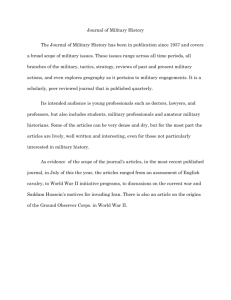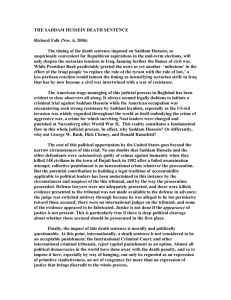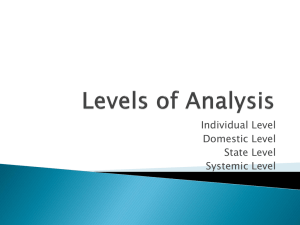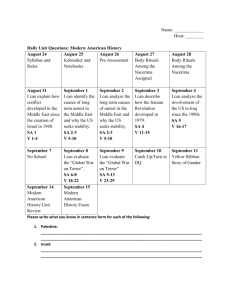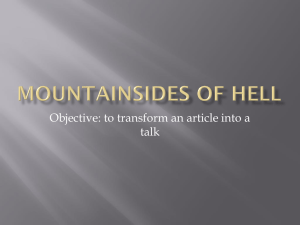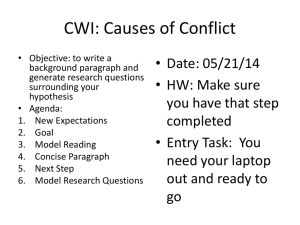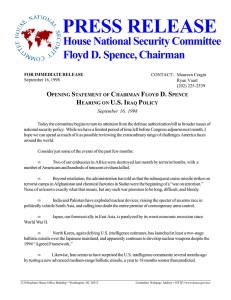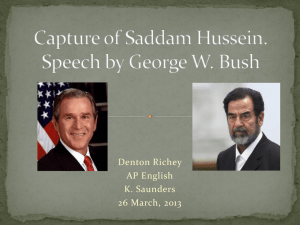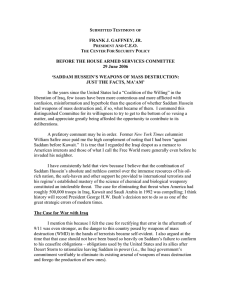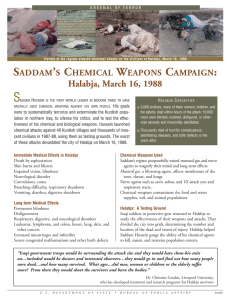S R. B SENATE ARMED SERVICES COMMITTEE TESTIMONY Washington, D.C.
advertisement
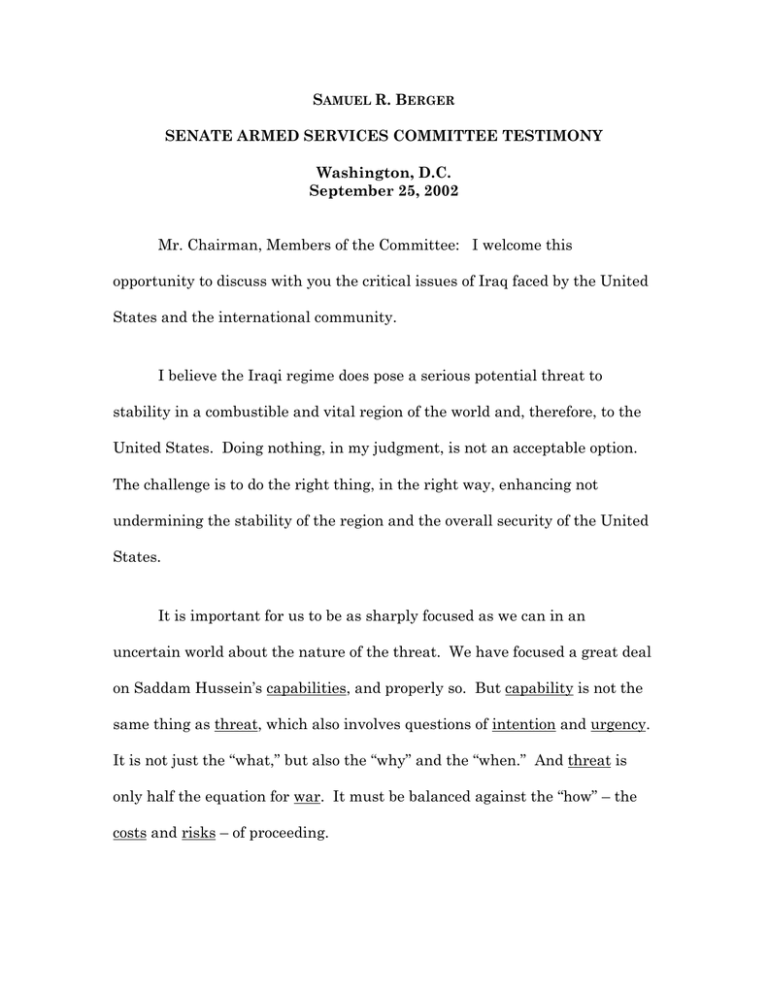
SAMUEL R. BERGER SENATE ARMED SERVICES COMMITTEE TESTIMONY Washington, D.C. September 25, 2002 Mr. Chairman, Members of the Committee: I welcome this opportunity to discuss with you the critical issues of Iraq faced by the United States and the international community. I believe the Iraqi regime does pose a serious potential threat to stability in a combustible and vital region of the world and, therefore, to the United States. Doing nothing, in my judgment, is not an acceptable option. The challenge is to do the right thing, in the right way, enhancing not undermining the stability of the region and the overall security of the United States. It is important for us to be as sharply focused as we can in an uncertain world about the nature of the threat. We have focused a great deal on Saddam Hussein’s capabilities, and properly so. But capability is not the same thing as threat, which also involves questions of intention and urgency. It is not just the “what,” but also the “why” and the “when.” And threat is only half the equation for war. It must be balanced against the “how” – the costs and risks – of proceeding. First, a few words about the “what” and the “why”. We know Saddam Hussein possesses chemical weapons – he has for nearly 20 years as we know only so well from his use of them against his own people and the Iranians. He has deadly stockpile of biological weapons. The possibility that Saddam Hussein will use his biological and chemical weapons to attack us, directly or in concert with terrorists, cannot be dismissed. We must continually evaluate it in light of available intelligence. But it would be uncharacteristic for a man who has placed the highest premium on self-preservation. There would be a significant chance of detection, followed – quite simply – by his annihilation. It is certainly possible, but no more so than the possibility he will use these weapons against our troops or our allies if we attack him. It is his nuclear weapons capability that concerns me the most: I believe Saddam Hussein’s strategic objective was, and remains, to assert dominance over the Gulf region. We stopped him in 1991. Amazingly, he tested our will again in 1994, moving troops in that direction; we deployed 30,000 U.S. forces to the region, and he pulled back. This region is critical for the U.S. and the world—strategically and economically. I believe that a nuclear Iraq can change its fundamental dynamic, affecting how others behave—toward us and toward allies such as Israel—and emboldening Saddam Hussein to believe, rightly or wrongly, that -2- he can attack his neighbors and, because of his nuclear capability, we will hesitate. Hussein maintains an active and aggressive nuclear weapons program. Most analysts believe that for him to develop his own capacity to produce fissile material—nuclear fuel—will require several years. Acquiring that nuclear fuel abroad—the “wild card”—could enable him to produce a nuclear weapon in one or two years, according to Prime Minister Blair. He has been seeking such material for many years. So far as we know, there has not yet been any case where significant quantities of weapons-grade fissile material has been diverted. Experts such as the highly respected International Institute for Strategic Studies have concluded that obtaining this material remains a “formidable” challenge – not impossible but “unlikely.” I emphasize this point not to suggest that the Iraqi nuclear weapons program is not strategically unacceptably dangerous to us; indeed, I believe it is. But the trajectory of his nuclear program affects the “when” of the threat equation: whether we have time to proceed in a way that isolates Saddam, builds a broader international coalition and minimizes, to the extent possible, the risks. -3- We most likely have the military power to do this virtually alone. But shifting the world’s focus back to Saddam’s intransigence will give us not only the power to act but far greater legitimacy if we do so. The extent to which the legitimacy of our actions is recognized and accepted internationally – that we can act collectively and not largely alone – is not an abstraction. It greatly reduces the risks of any future military action. Those risks are just as real and serious as the threat. They include: • Inflaming an already volatile region in a way that undermines governments such as Jordan or Musharraf in Pakistan and—worst case— leave us with a radical regime in Pakistan with a ready-made nuclear arsenal. • Increasing the likelihood that a conflict breaks along a dangerous Israeli-Arab fault line. • Diverting us from the war against a terrorist threat that remains real and virulent, at a time when cooperation – military, intelligence and political – is essential. -4- • And undercutting burden-sharing in what will certainly be a long, arduous task of maintaining stability in Iraq and rebuilding after Saddam Hussein—something that will not be easy or inexpensive. This brings me to the essential question: the “how” of going forward. How should we proceed in a way that maximizes our position? First, I believe we should press forward, as Secretary Powell is doing, for a UNSC resolution that makes clear that the world – not just the U.S. and Britain – expects compliance by Iraq with its disarmament obligations within a fixed time period. It should make clear that disarmament is Iraq’s responsibility, not the inspectors – requiring affirmative cooperation. Any resolution should spell out what “unfettered” means – any site, any time without notice. It should clear away the cobwebs that encumbered UNSCOM – vague notions about Iraqi sovereignty or special sites that provide the Iraqi government with a pretext for interference. Yes, there are a string of broken resolutions. But we are in an entirely new circumstance – contemplating a military invasion of Iraq – and the world expects us to test the non-military option before we move to a military one. We also owe that to the men and women who will be risking their lives if we decide to do so. -5- Unfettered inspections may not be the path to disarmament. But a serious effort to secure them is the path to isolating Saddam and gaining broader international support for what may be necessary if they fail. And we better obtain that legitimacy up front, because if military action is undertaken, we will be in Iraq for a long time. Second, with such a resolution, I would urge UNMOVIC to move expeditiously to test Saddam Hussein’s intentions, with hard sites not easy ones. What is in question is not whether UN inspectors can find the needles in the haystack, but whether – faced with the current situation – the Iraqi government will cooperate or obstruct. Third, I hope that, as was done after September 11, the draft Congressional resolution submitted by the Administration can be sharpened and adopted in a bipartisan fashion. Finally, Mr. Chairman, we reserve the right to act primarily by ourselves if we have to. But I don’t think we are at that point today and doing so substantially increases the risks that we will wind up with a region that is less stable, rather than more peaceful and democratic. We can proceed in a strategic, methodical manner to put Saddam Hussein in a corner, not us. -6-

